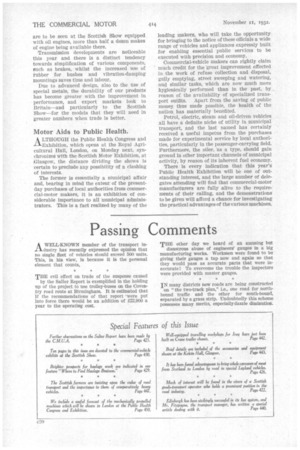Passing Comments
Page 62

Page 63

If you've noticed an error in this article please click here to report it so we can fix it.
AWELL-KNOWN member of the transport industry has recently expressed the opinion that DO single fleet of vehicles should exceed 500 units. This, in his view, is because it is the personal element that counts, THE evil effect on trade of the suspense caused by the Salter Report is exemplified in the holding up of the project to use trolley-buses on the Coventry road route at Birmingham. It is estimated that if the recommendations of that report were put Into force there would be an addition of £22,900 a year to the operating cost. THE other day we heard of an amusing but disastrous abuse of engineers' gauges in a big manufacturing works. Workmen were found to be giving their gauges a tap now and again so that they would pass as accurate parts that were inaccurate! To overcome the trouble the inspectors were provided with master gauges.
IN many districts new roads are being constructed on " the two-track plan," i.e., one road for northbound traffic and the other for south-bound, separated by a grass strip. Undoubtedly this scheme possesses many merits, especially dazzle diminution. SPEAKING a little while ago to the Western India Automobile Association, the President, Mr. H. E. Ormerod, said that, at the moment, the road v. rail bogy looms large on the horizon, not so much on account of the Indian railways having felt motor competition to any great .extent, but because times are had and all businesses are affected.
INDIA, he continued, is a very undeveloped country, and there is ample scope for road and rail transport to develop together. He firmly believed that the solution to the railway problem lies not in stifling road transport, but by the railways bringing their organization up to date. Rail transport must act as the servant, not as the master of its patrons, as has been the tendency in the past.
THE suggestion that prices of oil fuel would naturally rise so soon as compression-ignitionengined vehicles became popular, because there would then arise the problem of distribution, is not so frequently heard. It seems as though there is going to be no difficulty in distribution. The fuel consumption is so small that there are few vehicles which cannot carry sufficient reserve for the longest Journey they have to make. AN interesting material, known as Cronite, is being produced by the Cronite "Foundry 'Co., Ltd., Lawrence Road, Tottenham, London, N.10. It is an alloy consisting essentially of nickel and chromium, and although higher in cost than iron or steel, yet for use at high temperatures it is more economical, as it resists distortion, scaling and cracking to a remarkable degree. It is tough, but readily machinable, can be welded, is rustless and will take a high and permanent polish. One of its uses is for pyrometer sheaths. It is not fragile like silica insulating tubes. It can also be employed for casehardening boxes which can, if necessary, be quenched direct.
CONSIDERABLE publicity was recently given by the Midland papers to an accident which occurred in connection with an M.R.S. vehicle, resulting in considerable damage to a shop in the centre of Birmingham. An interesting feature about this is that the woman occupier of the shop wrote to M.R.S., Ltd., to the effect that the driver had performed a very gallant action and had taken the only possible course to avoid collision with a bus, which would most probably have had fatal results. She asked that this should be taken into consideration when the company was dealing with the case.




















































































































































